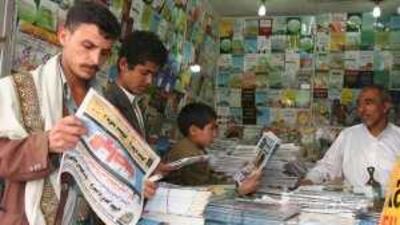SANA'A // A draft law on access to information that the Yemeni parliament is scheduled to debate this week has already drawn criticism from journalists and democracy activists who describe it as restricting press freedom.
"This draft law proposed by the government is authoritarian and aims to exercise more restrictions, as it prohibits the search for and publishing of information under several pretexts such as the protection of national security, national unity and the like," said Marwan Damaj, the secretary general of Yemen Journalists Syndicate, a non-governmental organisation. The draft law concedes that access to information is one of the basic rights of citizens, but stipulates that the release of information should not damage national security or social cohesion, Yemen's foreign relations, the national economy and public and private economic, trade and financial interests.
Anyone found breaking these rules could be sentenced to six years in jail. "Who is to decide this or that information will damage the national security or unity? Such open-ended and loose provisions will make the life of journalists in particular risky and their job difficult. Our job as journalists is reporting the truth and informing the public, but under this draft law, our task becomes a sort of a criminal act," Mr Damaj said.
A report by Women Journalists Without Constraints, a non-governmental organisation, showed that most violations of press freedom last year were related to news reporting and preventing journalists from accessing information, such as arresting and confiscating cameras from those trying to cover a protest in the capital in November. Violations jumped last year to 248 cases from 113 in 2007. "Press freedom in Yemen will continue to be abused and restricted and the public will continue to play a less influential and active role in political and social development unless new legislation securing the right of access to information and circulation is passed," said the report, which was made public on Saturday.
The Committee to Protect Journalists noted last week that journalists work in precarious conditions in Yemen, where they are subject to criminal charges and censorship from government officials. "A harsh press law set restrictions on coverage of the presidency, state security and religion. Authorities kept particularly tight control on coverage of an insurgency led by tribal and religious figures in the north-western Sa'ada region," the New York-based group said.
It was continued harassment of journalists that pushed some reporters and human rights activists to call for a new law on access to information. The idea was picked up by Ali Ashal, an opposition member of parliament, who in November proposed a draft that had been written in consultation with some MPs, journalists and other civil society activists. It was approved by the constitutional and media committees in parliament and then handed to the parliament presidium to consent its debate.
However, the government proposed its own version of the information law, presented it to parliament's media committee on Saturday. The move provoked a fierce outburst from some MPs who accused the government of attempting to thwart a progressive draft. "The government could have commented on the draft but by presenting an alternative one they are trying to thwart the debate," said Abdulrazak al Hajri, an opposition member of parliament.
Mr al Hajri said the two drafts were drastically different. "The first considers releasing information one of the basic rights of the people while the second deals with information as secrets and taboos," he said. Mr Ashal's draft law states that no official employees should be punished for giving government information to a citizen who requests it, but makes it a crime to refuse to do so, punishable by three months in jail or a fine of US$750 (Dh2,750).
Sadeq al Himyri, the general manager of information services at the National Information Centre, the government agency that drafted the alternative law, defended its version, saying it was meant to organise rather than control information delivery. Mr al Himyri said the draft law still needed to go through a process of review before it was adopted. Yesterday, about 70 MPs in the 301-seat parliament said they would reject any information law that was not the one proposed by Mr Ashal. The ruling party holds 85 per cent of seats in parliament.
malqadhi@thenational.ae

